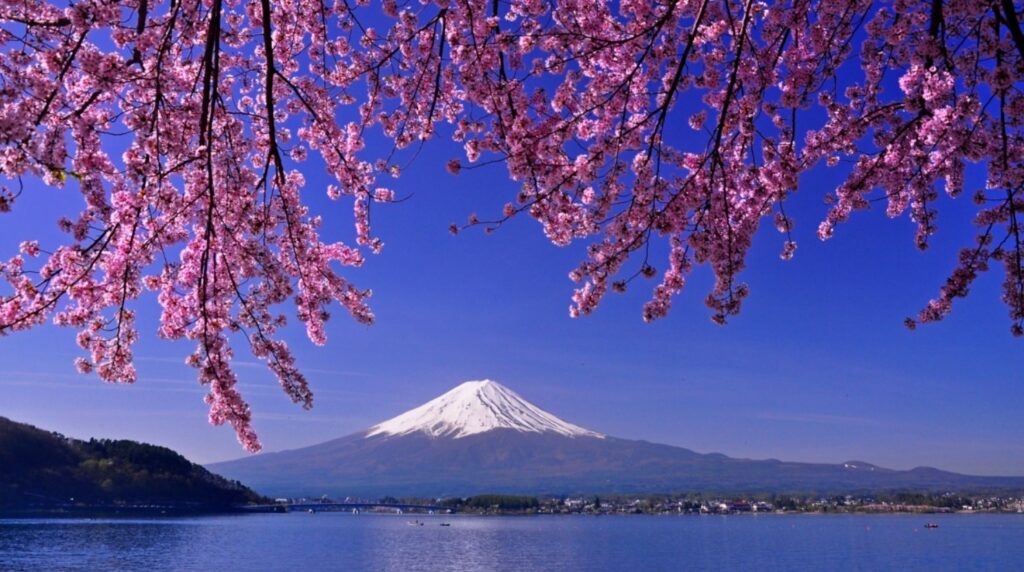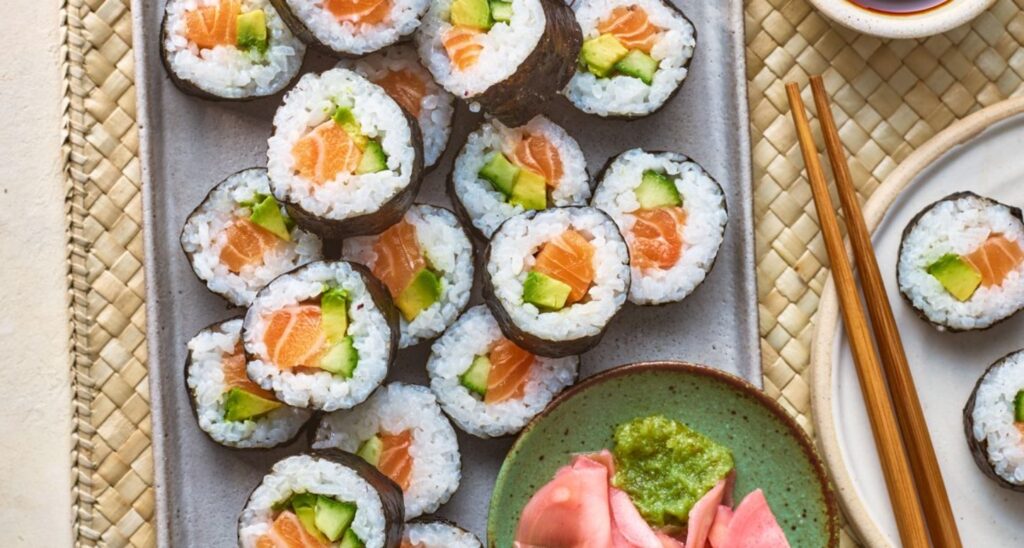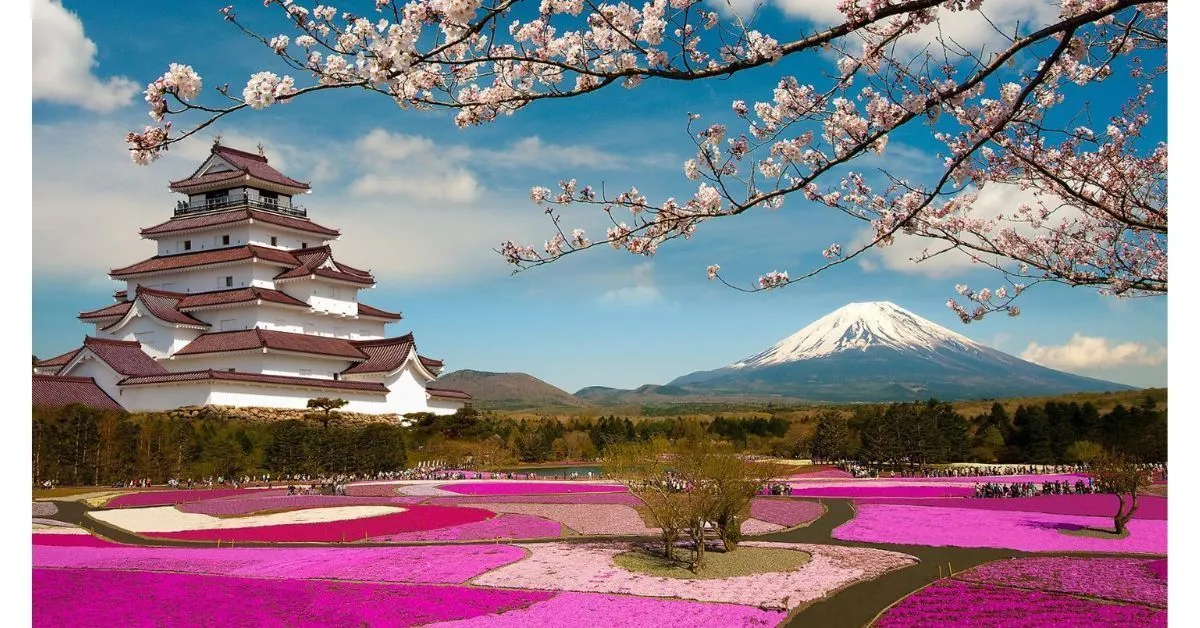Japan, situated in East Asia, is an island nation nestled in the northwest Pacific Ocean. It shares borders with the Sea of Japan to the west, stretching from the Sea of Okhotsk in the north to the East China Sea, the Philippine Sea, and Taiwan in the south. Positioned within the Ring of Fire, Japan comprises an archipelago of 14,125 islands, with its five primary islands being Hokkaido, Honshu, Shikoku, Kyushu, and Okinawa.

The geographical landscape of Japan is characterized by rugged terrain, with over four-fifths of its landmass dominated by mountains. Among its notable features are numerous active and dormant volcanoes, including Mount Fuji, towering at 12,388 feet (3,776 meters) as Japan’s highest peak.
Japan boasts a sizable and predominantly homogeneous population, primarily comprising individuals of Japanese descent. Although there are minority groups such as Ainu, Ryukyuan, and Koreans, the population is heavily concentrated in urban areas. Tokyo is the capital and the largest city.
Celebrating its rich cultural heritage, Japan showcases traditional arts such as meticulous tea ceremonies, elegant calligraphy, and refined flower arrangements known as ikebana. The country takes pride in its revered theatrical forms such as Noh and Kabuki, alongside the vibrant festivities of cherry blossom viewing (hanami) and traditional festivals (matsuri), which showcase colorful costumes, captivating music, and lively dances.
Renowned for its technological prowess, Japan is a global leader in innovation. It is home to famous tech giants and pioneering contributions in robotics, automotive manufacturing, electronics, and video gaming.

Internationally recognized brands like Sony, Toyota, Nintendo, and Panasonic hail from Japan, symbolizing its technological prowess on the world stage. Japanese cuisine enjoys widespread acclaim for its diversity and meticulous preparation, emphasizing fresh, seasonal ingredients. From world-famous sushi to comforting ramen, Japan’s culinary delights captivate palates worldwide. Crispy tempura and savory yakitori are also beloved staples of Japanese cuisine. Renowned for their exquisite presentation and attention to detail, these dishes showcase the culinary mastery of Japan.
Safety and cleanliness are integral to Japan’s societal fabric, earning it a reputation as one of the safest and cleanest countries globally. With relatively low crime rates, Japan’s emphasis on cleanliness reflects the cultural value placed on maintaining tidy surroundings. Well-maintained public spaces further contribute to this perception of cleanliness.
Beyond its urban landscapes, Japan’s natural beauty enchants visitors with iconic landmarks like Mount Fuji. Serene cherry blossom gardens and tranquil bamboo forests are also among the captivating attractions. Additionally, rejuvenating hot springs (onsen) offer visitors a chance to relax and unwind amidst nature’s splendor. The country’s diverse outdoor offerings, including hiking, skiing, and exploring its vast national parks, invite exploration of its breathtaking landscapes.
General and Fun Facts about Japan

- Anime: Japan has a massive animation industry, producing up to 60% of the world’s animation-based entertainment. People across the world adore anime, a popular form of Japanese animation, renowned for its diverse range of genres and unique art styles.
- Maid Café: These themed restaurants feature waitresses dressed in maid costumes who treat customers as if they were masters in a private home. Maid cafes offer a unique dining experience, blending cosplay culture with hospitality.
- Maglev: Japan is home to the world’s fastest floating train, known as the Maglev. Furthermore, This magnetic levitation train utilizes cutting-edge technology to achieve remarkable speeds, offering passengers a futuristic mode of transportation.
- Washlet: Renowned for their advanced features, Japanese toilets include bidets. Also, Washlets provides users with a hygienic and comfortable bathroom experience, showcasing Japan’s commitment to innovation in everyday amenities.
- Geisha: Skilled female entertainers known as geisha perform traditional Japanese arts like dance, music, and tea ceremony. Moreover, They embody elegance and grace, preserving centuries-old cultural traditions.
- Fortune Cookie: Despite common belief, the fortune cookie originates from Japan. Moreover, Japanese immigrants introduced this sweet treat to the United States, and the United States now widely associates it with Chinese cuisine.
- Sushi: Originating as street food, sushi has become a globally renowned Japanese cuisine. Made with vinegared rice, fresh seafood, and other ingredients, sushi reflects Japan’s culinary expertise and attention to detail.
- Aokigahara Forest: Also known as the Sea of Trees, Aokigahara is a dense forest at the base of Mount Fuji. Drawing visitors from around the world with its serene beauty, the site is also steeped in legends and folklore.
- Square Watermelons: In Japan, farmers grow square watermelons for practical reasons, such as ease of stacking and storage. Furthermore, This unique agricultural practice highlights Japan’s innovative approach to farming and food production.
- Sumo Crying Baby Festival: This festival features sumo wrestlers holding babies and competing to make them cry first, believed to bring good health to the child. It’s a charming example of Japan’s blend of ancient traditions and playful customs.
- Island Nation: Japan is an archipelago consisting of over 6,000 islands, with four main islands: Honshu, Hokkaido, Kyushu, and Shikoku. Its geographical diversity contributes to a rich tapestry of landscapes and ecosystems.
- Land of the Rising Sun: The name “Japan” translates to “Land of the Rising Sun” in Japanese, a poetic reference to its eastern location and the symbolism associated with the sunrise.
- Technological Advancements: Japan drives progress across various fields through its pioneering technological innovations. Furthermore, ranging from high-speed trains to robotics and electronics, earning it a reputation as a global leader in research and development.
- Nobel Laureates: Japan boasts a total of 28 Nobel Prize winners across various categories, recognizing the nation’s contributions to science, literature, and peace efforts.
Read Also
Knicks vs Pacers: The Knicks won | 1 Led by Jalen Brunson
England Interesting Facts | Facts You Never Knew
10 Funny Facts: From TV Shows To Celebrity Demands
Interesting Facts About Iron | Unveiling Its Magnetic Mysteries

- Unique Transportation: Japanese train stations often have staff to help manage crowds during peak hours, reflecting the country’s dedication to efficiency and customer service in public transportation.
- Punctuality: With minimal delays averaging only 18 seconds, Japanese trains celebrate their punctuality. This commitment to timeliness is a testament to Japan’s strong work ethic and organizational skills.
- Cultural Etiquette: Japan places great importance on cultural etiquette, including manners such as refraining from eating while walking and avoiding phone calls inside the Shinkansen (bullet train). Also, These customs reflect a respect for social norms and consideration for others.
- Economic Strength: As the world’s largest creditor nation, Japan plays a significant role in the global economy. Moreover, with a robust financial sector and diverse industries driving growth and innovation.
- Animation Hub: Japan’s animation industry is a powerhouse, producing the majority of the world’s animated shows. Moreover, Its influence extends beyond entertainment, shaping popular culture and inspiring audiences worldwide.
- Geographical Landscape: Over 80% of Japan’s land is mountainous, contributing to its stunning natural scenery. This challenging terrain poses obstacles to development and agriculture in the country.
- Seismic Activity: Japan experiences frequent earthquakes due to its location along tectonic plate boundaries. Despite this, the country has developed advanced seismic technologies and stringent building codes to mitigate the impact of earthquakes and ensure public safety.
FAQ’s
Japan is renowned for its rich cultural heritage, traditional arts, and distinctive cuisine. From meticulous tea ceremonies to elegant calligraphy and refined flower arrangements known as ikebana, Japan’s traditional arts captivate visitors worldwide. Additionally, the country boasts a vibrant popular culture, including manga, anime, and video games, with a global following. Highly regarded for its healthy and diverse offerings, Japanese cuisine features rice, fish, and vegetables.
Japan is recognized as the Third strongest country across various domains. With one of the largest economies globally, it has made significant contributions to science and technology, particularly in the automotive, robotics, and electronics industries. Known for its advanced infrastructure and efficient manufacturing processes, Japan maintains a formidable Self-Defense Force. However, Japan’s power and influence are subject to varying assessments, with recent years showing potential challenges in sustaining its resources. Discussions also revolve around Japan’s role in global security and its defensive capabilities.
Renowned for its rich cultural heritage, Japan includes tea ceremonies, calligraphy, and ikebana. It’s also famous for anime, cuisines like sushi and ramen, and efficient bullet trains. Cultural festivals and exceptional service industry standards further highlight Japan’s appeal, along with natural landmarks like Mount Fuji and Miyajima Island.










